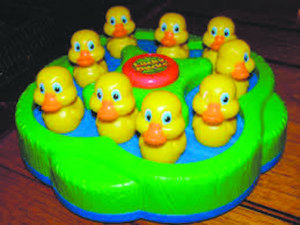
 In the mid-nineties I purchased as a Christmas gift for my preschool-aged daughter the popular battery-operated game Lucky Ducks. I’ve kept the game, along with many other vintage toys and games, in my basement all these long years. So, it made sense to bring the game out for granddaughter Olivia on one of her early visits to my house. Unbelievably, the original batteries still worked.
In the mid-nineties I purchased as a Christmas gift for my preschool-aged daughter the popular battery-operated game Lucky Ducks. I’ve kept the game, along with many other vintage toys and games, in my basement all these long years. So, it made sense to bring the game out for granddaughter Olivia on one of her early visits to my house. Unbelievably, the original batteries still worked.
Olivia, then aged 18 months, was drawn to the game, until we turned it on. Lucky Ducks features a revolving base upon which twelve plastic ducks go around in circles squawking loudly. Four players receive color-coded cards, and then start claiming random ducks with color-coded stickers that can’t be seen while the ducks are circling in the “pond.” If the selected duck doesn’t match the player’s card, they must put the duck back. The first player to claim three same-colored ducks wins.
On Olivia’s first visit, before we flipped the “on” switch, she was lifting the ducks, inspecting them, and then handing them around to the adults in the room. When I collected up the ducks and turned the game on however, she immediately become scared, got up and ran crying to her mother. She kept crying, obviously afraid of the noise of the revolving base and the squawking ducks. I immediately turned the game off and took it out of the room. For the rest of the visit Olivia—though still unsettled—played with another toy from the basement trove, a pastoral Fisher-Price farmhouse.
On a more recent visit, I brought the Lucky Ducks out again. My daughter needed some downtime at home, so it was just Olivia and her father who came for dinner that night. While the game was off, Olivia, now over two years old, was drawn to it again, lifting the plastic ducks, inspecting them, showing them to family members, and saying “Duck.”
After dinner I asked her father if maybe we should turn the game on, “to see if she is still afraid of it.”
He said OK, so I fired up the rotating ducks and their loud squawking.
We found out in the first few seconds that Olivia was still afraid of those noisy ducks and the rotating platform. With an expression of distress, she immediately left the family room and walked into the kitchen. It was almost as if she had forgotten that her Mom hadn’t joined us and was looking for her. She didn’t exactly cry, but was anxious, and it was obvious that tears were on the way.
But then she did a remarkable thing. She turned around, faced the revolving ducks, and moved back toward the game. In a deft movement, she snatched two of the ducks off the circulating base and retreated with them into the kitchen.
It was clear to us that what Olivia had done was very brave. She had rescued two of the ducks from something she perceived as a horrifying ordeal. She had conquered her fear long enough to think about the fate of those poor ducks, consigned to endlessly revolve and squawk for their lives on a terrifying roundabout.
I turned the game off, and again the playtime had been unsettled.
But at least two of the ducks had been saved. Olivia had identified with those cute plastic ducks, and had overcome her fear long enough to rescue them.
A new and improved Lucky Ducks game is still available from Milton-Bradley. My daughter’s vintage Lucky Ducks game will remain in the basement, for now.
No Comments
Leave a comment Cancel